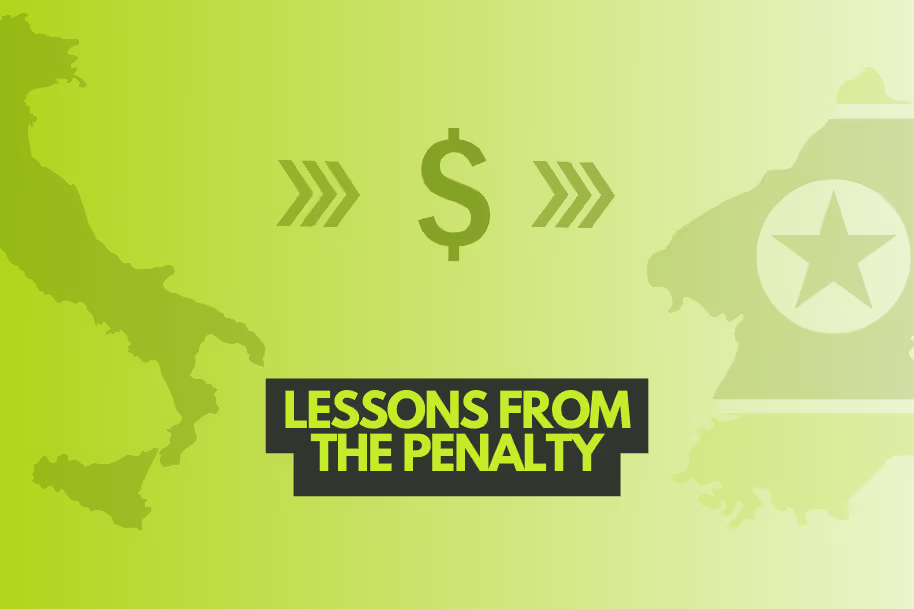
OFAC Penalizes Italy's Mondo TV: Key Insights You Need to Know
OFAC recently slapped a half-a-million-dollar penalty on a leading Italian animation studio. In this report, we delve into the case and uncover valuable lessons for sanctions compliance officers worldwide.
It’s rare for animation studios - let alone ones based in Rome - to get embroiled in the enigmatic world of sanctions. However, the recent case of Mondo TV (Mondo) reveals that, regardless of industry or location, strict compliance with OFAC sanctions laws is essential for every business.
This case arouses curiosity: How did a leading Italian TV production company find itself caught in the complex web of OFAC sanctions against North Korea? And more importantly, what can sanctions compliance teams learn from this high-profile case?
Without further ado, let’s dive in.
Mondo TV's OFAC Penalty: How It All Began
As we already alluded to, Mondo is a well-established Italian animation studio headquartered in Rome, renowned for its work in creating animated series and films for children and families. With a long history of successful projects and international collaborations, Mondo has been a significant player in the global animation industry.
The pivotal facet of this case is that Mondo began subcontracting animation work to a North Korean entity known as Scientific Educational Korea Studio (SEK) back in the 1990s, engaging the studio for various projects, including popular childrens animations.
And here’s a crucial point: Before 2016, the sanctions framework permitted this type of business relationship. After 2016, however, the US government tightened sanctions, making such dealings illegal.
But there was a problem.
Despite the new regulations, Mondo still had outstanding debt with SEK, which led to the violations of the sanctions laws.
Mondo TV’s OFAC Penalty: Unpacking the Violations
To understand the $538,000 penalty imposed on Mondo by OFAC it’s essential to unpack the violations that led to this significant enforcement action. You can view the enforcement release in this PDF.
But here's an overview of what went wrong and how Mondo found itself in breach of US sanctions laws.
Problematic Activities
By July 2019, Mondo TV and SEK formalized an agreement to settle outstanding debts from previous projects and to continue new work under the 2019 contract. This agreement was crucial because it marked the period during which Mondo activities became problematic under the new sanctions regime.
How the Violations Unfolded
Here’s a breakdown of how Mondo's OFAC sanctions violations took shape over time:
Outstanding Debt: Mondo owed approximately $1,123,120 to SEK for several past projects.
Monthly Payments: To resolve this debt, Mondo agreed to make monthly payments starting in July 2019. This included settling past dues and funding new projects SEK would undertake.
Payment Channels: SEK issued invoices for these payments, which named third-party companies and provided their bank account details. Mondo followed these instructions and made 18 wire transfers between May 2019 and November 2021.
- 12 payments were made to a US company’s account at a US bank.
- 1 payment was a US dollar-denominated transfer cleared by a US correspondent bank.
- 5 payments were made to a foreign company’s account at a US bank.
To sum up, the business transactions with SEK between May 2019 and November 2021 were deemed violations because the North Korean entity was and remains subject to US economic sanctions under the North Korea Sanctions Regulations (NKSR).
What the Mondo Case Teaches Us About OFAC Sanctions Compliance
The Mondo penalty is more than a legal consequence; it’s a learning opportunity for all involved in sanctions compliance. Let’s explore the key takeaways from this significant enforcement action.
Lesson 1: Use the US Dollar? You Must Perform OFAC Sanctions Checks
One of the central lessons from the Mondo case is that any business or organization worldwide using the US dollar in transactions must perform OFAC sanctions checks (this is a core service offered by sanctions.io).
The OFAC enforcement action against Mondo, a non-US company, should come as no surprise, particularly in light of the March 2024 Tri-Seal Compliance Note, which emphasized the global scope of US sanctions laws and the crucial need for sanctions checks for entities outside the US.
A sanctions check, also known as sanctions screening, prevents businesses from engaging in transactions with individuals and entities subject to sanctions due to their involvement in illegal or prohibited activities. When a business performs a sanctions check, it accesses a global database that checks to see if any customers or business partners appear on sanctions lists - such as OFAC's.
Lesson 2: Understand Sanctions Regulations Thoroughly
The Mondo case demonstrates that a deep understanding of sanctions regulations is not just a best practice but a critical requirement for avoiding violations.
Here are some quick tips:
- Stay Updated on Regulations: Regularly review OFAC guidelines and updates to keep your compliance efforts current.
- Invest in Sanctions Compliance Training: Ensure that your team is well-versed in sanctions laws through regular training and updates.
- Document and Review Compliance Efforts: Maintain detailed records of your compliance procedures and periodically review them for effectiveness.
- Perform OFAC Sanctions Screening: Use comprehensive tools to screen transactions and business partners for potential sanctions violations.
- Formulate a Sanctions Screening Process: Develop and maintain a structured process for sanctions screening to ensure consistent and thorough compliance.
Lesson 3: The Importance of Effective Sanctions Screening Processes
Expanding on the final point from the list above, one of the most critical lessons from the Mondo case is that having an effective sanctions screening process is essential for preventing violations and ensuring compliance with OFAC regulations.
Need assistance? Download our free sanctions screening guide to learn how to build a robust sanctions screening process for your organization.
The guide provides a comprehensive overview of the legal framework, effective compliance strategies, practical advice for setting up your screening process, industry-specific insights, and essential resources to support your compliance efforts.
Final Thoughts & How sanctions.io Supports OFAC Compliance
The OFAC enforcement action against Mondo offers important insights into the complexities of international sanctions regulations and their far-reaching impacts. The case is a vivid reminder that US sanctions laws have broad global applicability, extending beyond US borders to affect companies worldwide.
If you are a non-US firm, are you sure that you are fully OFAC compliant? This is where effective sanctions screening becomes crucial.
sanctions.io is a highly reliable and cost-effective solution for sanctions and AML screening. AI-powered and with an enterprise-grade API with 99.995+% uptime are reasons why customers globally trust us with their sanctions screening needs. To learn more:
We also encourage you to take advantage of our free 7-day trial (no credit card is required).



